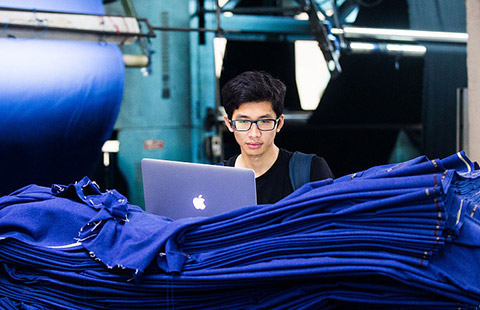Investors shrug off risk concerns to pursue higher returns
Signs of a winding down of the United States' monetary easing program may have raised concern in many developing markets about a massive outflow of hot money into US securities.
But in China, investors and consumers are rushing to sign up to an online payment platform that invests customers' money in what it describes as "low risk, high return" currency funds.
Such funds are structured by banks to invest mainly in higher-yielding corporate and local government bonds.
The fast-growing popularity of these funds among many local and international investors has been "phenomenal", said Sun Lijian, head of Fudan University's Finance Research Center.
Financial experts and economists said that much of the hot money that flooded China since the US Federal Reserve began its bond purchase program is parked in currency funds where it can take advantage of higher yields and the appreciation of the renminbi.
Alipay, China's leading third-party online payment platform and a subsidiary of China's e-commerce giant Alibaba Group Holding Ltd, said on Thursday that more than 1 million users have opened "yu'ebao" accounts, which link to a low-risk online investment fund, six days after the product was made public.
But experts warn that even a low-risk investment may become risky if there are systemic financial market problems.
The company said earlier that it will offer nearly 800 million of its users the option to invest directly with the private Tianhong Fund, using spare cash from Alipay accounts. The Tianhong Fund is a currency fund that claims it offers higher returns than current deposits, but with a low risk.
Alipay said annual earnings for investors in the fund could exceed 4 percent. Investors can put in as little as 1 yuan (16 US cents). Many deposit products require tens of thousands of yuan.
Depositors can redeem their funds at any time, and the capital can be used directly for online payments or transferred, even without redemption.
But some experts warn that the phasing out of quantitative easing in the US will cause capital outflows and lead to volatility in domestic financial markets, making "low-risk" currency funds risky.
Real money market interest rates jumped in June in China. The overnight Shanghai interbank offered rate (SHIBOR) rocketed 578.4 basis points to 13.44 percent on Thursday.
"Such high levels of real market rates are completely inconsistent with the recent slowdown of both growth and inflation," Dariusz Kowalczyk, senior economist at Credit Agricole CIB in Hong Kong, wrote in a note on Thursday.
"We should be very careful about the sudden withdrawal of hot money from the Chinese market, which may disrupt the domestic market. Small investors will be direct victims if that happens," said Sun.
"No one could guarantee fixed returns ... if systemic risk occurs in China's financial markets," said Zito Chen, a fund manager.

























